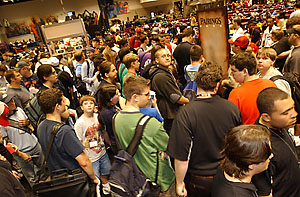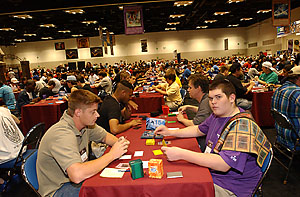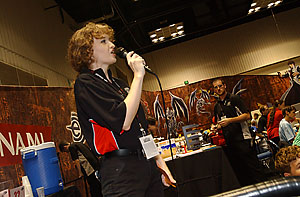Whenever we’re at a large Yu-Gi-Oh! TCG event providing coverage, Metagame.com reporters usually find that there’s no shortage of players who’d like to get in the spotlight. While there are some people who don’t want any media attention, they are few and far between! You’ll meet all three of us if you go to enough events—Metagame.com’s Yu-Gi-Oh! reporters are Jason Grabher-Meyer, Jerome McHale, and myself, Julia Hedberg. We’re there to cover the event, feature new decks and tech, and provide match coverage and interviews to bring the event to all readers. We like to cover familiar faces because the public is interested in them, and we also like to find and feature brand-new stories, people, and strategies.
 Since there are hundreds of you at a tournament and there’s usually only one of us, not everyone can get that kind of attention! At any of the events I’ve covered, there are always stories I’d like to have written but just didn’t have time, and people I’d like to have interviewed but had to pass over. Since so many of you have asked me either on site or through email how to get coverage at these events, today I’m going to tell you. In this article, I’m going to explain how to improve your chances of getting covered, how to make your coverage the best it can be, and how to interact with the reporters.
Since there are hundreds of you at a tournament and there’s usually only one of us, not everyone can get that kind of attention! At any of the events I’ve covered, there are always stories I’d like to have written but just didn’t have time, and people I’d like to have interviewed but had to pass over. Since so many of you have asked me either on site or through email how to get coverage at these events, today I’m going to tell you. In this article, I’m going to explain how to improve your chances of getting covered, how to make your coverage the best it can be, and how to interact with the reporters.
Let’s begin with . . .
Interviews
Most people would rather read an article about an interesting player who has a unique story, is playing a unique deck that preformed well, and who made insightful comments about the game, rather than an article about a relatively new player with a starter deck who dropped out of the tournament after round 3. In other words, the more interesting you are to other people—not just to yourself and your friends—the more likely you are to be interviewed! If you want to be interviewed, be prepared to talk about yourself. That probably seems obvious, but some people tend to flounder in response to the questions. You can avoid that by having interesting stories or facts about yourself ready to share. Additionally, you should always remember to be available for a photo opportunity.
We look for people who are comfortable being interviewed and have something interesting to say, like an intriguing personal history in the game, well-considered opinions on the event or format, or an innovative idea in deckbuilding. A positive attitude helps, too. We aren’t looking for people who complain about their losses, how much they hate the format or MANTIS, or about what a rotten cheater a rival player or team is. That’s actually not as interesting as you might think.
Deck Profiles
When we’re writing deck profiles, we want to see unusual decks. We like totally new ideas and new versions of decks that haven’t seen play for a while that have performed well at the event. Adding a couple of different cards to a cookie-cutter build doesn’t usually cause a deck to qualify as, “new and innovative.” Also, decks that are winning are more likely to be covered. Even if you’ve got something absolutely fascinating, if your record is 1-3 in round 4 . . . then, well, it’s probably not going to get featured.
If your deck is chosen, be ready to talk about it—how you developed it, what it can do, which matchups you love, and which ones you dread. Explain your side deck, and why you chose the cards you did. Decklists won’t be posted until the end of the day, so readers want a good idea of what your deck does so they can understand it.
You can turn down a deck profile if you want. Some players complain that having a deck featured on Metagame.com will only encourage netdeckers to copy it. If your deck is really that good, it’s probably going to be copied anyway, so you might as well go on the record claiming it as your invention, right? The Yu-Gi-Oh! world is smaller now that so many players travel from event to event. People aren’t limited to their own little corner of the metagame anymore, and they get ideas from all over. Unless you can come up with a way to play your deck without anyone actually ever seeing its contents, it’s more or less fair game. I remember someone standing behind me on the mall tour, taking pictures of my cards in hand each turn with a digital camera. You get the idea.
Team Profiles
 Team activity at large events is of interest to most readers, so we like to provide a team profile or two at each event. With so many teams to choose from, how do we pick the teams to profile? There are a lot of factors that influence our choice. We look for teams with well-known or recognizably good players, teams with a solid presence at the event, and a good team spokesperson who interacts well with the reporter. Teams desiring coverage should be available for a picture, have interesting decks or tech, and be ready to tell some exciting personal stories. Attitude is also a big factor. If you’re pushy or you act in a disrespectful manner to other people at the event, then we’re not interested in covering your team.
Team activity at large events is of interest to most readers, so we like to provide a team profile or two at each event. With so many teams to choose from, how do we pick the teams to profile? There are a lot of factors that influence our choice. We look for teams with well-known or recognizably good players, teams with a solid presence at the event, and a good team spokesperson who interacts well with the reporter. Teams desiring coverage should be available for a picture, have interesting decks or tech, and be ready to tell some exciting personal stories. Attitude is also a big factor. If you’re pushy or you act in a disrespectful manner to other people at the event, then we’re not interested in covering your team.
If you think you have what it takes, approach us before the event starts and introduce your team. Please choose your time wisely—if we’re talking to the Tournament Organizer or resolving internet issues, kindly wait until we are done, rather than jumping in and interrupting. We’ll arrange an interview if you catch our interest. Next, choose a team spokesperson, who should take some time to get ready for the interview. Have some good stories and some biographical facts on your members, like their names, ages, and tournament records, and make sure all the team members are in the area, so they can pose for a picture. If this information is ready, the interview will go much quicker. Trying to call team members to verify facts or find everyone for a picture can waste a lot of time.
 Feature matches are chosen for a variety of reasons. Perhaps the match involves well-known duelists, or one of the players is using a deck that we featured earlier in the tournament. Sometimes we choose them to show what happens when you pit one archetype against another, or simply to show what’s happening at the top tables. Match coverage usually comes later in the event, once the pace of the event has been established.
Feature matches are chosen for a variety of reasons. Perhaps the match involves well-known duelists, or one of the players is using a deck that we featured earlier in the tournament. Sometimes we choose them to show what happens when you pit one archetype against another, or simply to show what’s happening at the top tables. Match coverage usually comes later in the event, once the pace of the event has been established.
If you are chosen for a feature match, you’ll generally have a separate area to play out the match. When you begin your match, please make an effort to be clear about what you are doing for each of your turns. We hate having to back up the game, or worse yet, miss part of a play. You don’t have to impress everyone with how fast or vaguely you can play—I’ve done match coverage on games where duelists didn’t even resolve their plays, they just sort of waved cards at each other in a weird sort of duelist semaphore. Please don’t do that! It’s harder than you might think to type out what happens in a duel as it is happening, so do your best to make it as easy for us as possible. If you will announce what you’re doing (because we do need to glance from table to computer from time to time), keep your field organized so we can easily see what is going on, resolve your chains clearly, and keep plays separate, you’ll find that you get much more accurate match coverage. Bear in mind we may interrupt from time to time to verify life points, or clarify an action we may have missed—but we’ll do these things as unobtrusively as possible.
We’re at the event doing a work-intensive job in a high-energy, fast-paced environment. We like to meet players and would like you to stop by and say “hi,” but he sure to exercise some good judgment. We’re expected to generate a solid amount of varied, exciting event coverage and to submit it as quickly as possible, because the readers are waiting—and they have no problem letting us know they’re still waiting! It’s hard to do that if players are in the way. Despite the lure of our fascinating company, try not to hang about us continually making casual conversation. Resist that fatal attraction!
 We also aren’t part of the TO staff, so we usually can’t answer questions about the event—regardless of how clever and efficient we look sitting up in the staff area typing away on a laptop! Although Jason, Jerome, and I are all Level 3 judges, we’re attending the event as reporters. We can’t get involved in rulings decisions—that’s the judges’ job. If you have a question after the event, each of us has an email address that’s available on the website. Go ahead and send along an email to get clarification on something, rather than just making an assumption about the coverage.
We also aren’t part of the TO staff, so we usually can’t answer questions about the event—regardless of how clever and efficient we look sitting up in the staff area typing away on a laptop! Although Jason, Jerome, and I are all Level 3 judges, we’re attending the event as reporters. We can’t get involved in rulings decisions—that’s the judges’ job. If you have a question after the event, each of us has an email address that’s available on the website. Go ahead and send along an email to get clarification on something, rather than just making an assumption about the coverage.
Finally, if you don’t get coverage in the event, don’t take it personally or harass us. There’s always going to be more things at the event that are worth covering than one reporter can do. There are hundreds of you, and only one of us, so please be understanding.
The Shonen Jump events have given a huge boost to Organized Play, and event coverage has helped popularize new decks as well as many teams and individuals. As the series continues into 2006, Metagame.com will be there, making sure that whatever happens, everyone gets to hear about it. If you’re lucky, you’ll be a part of it, too. See you at the next Shonen Jump Championship!